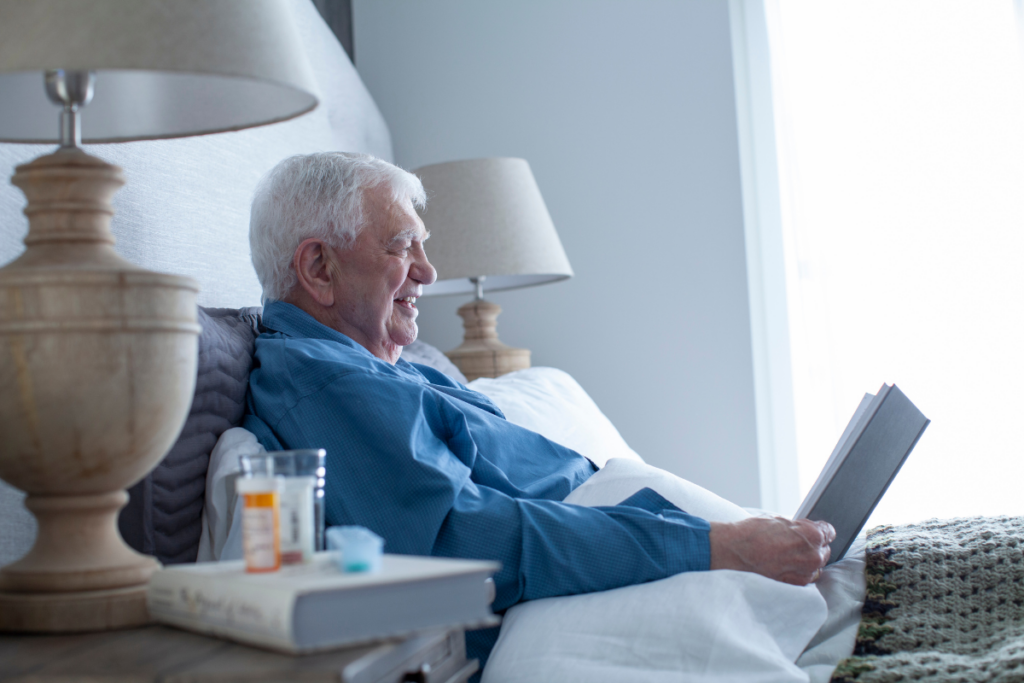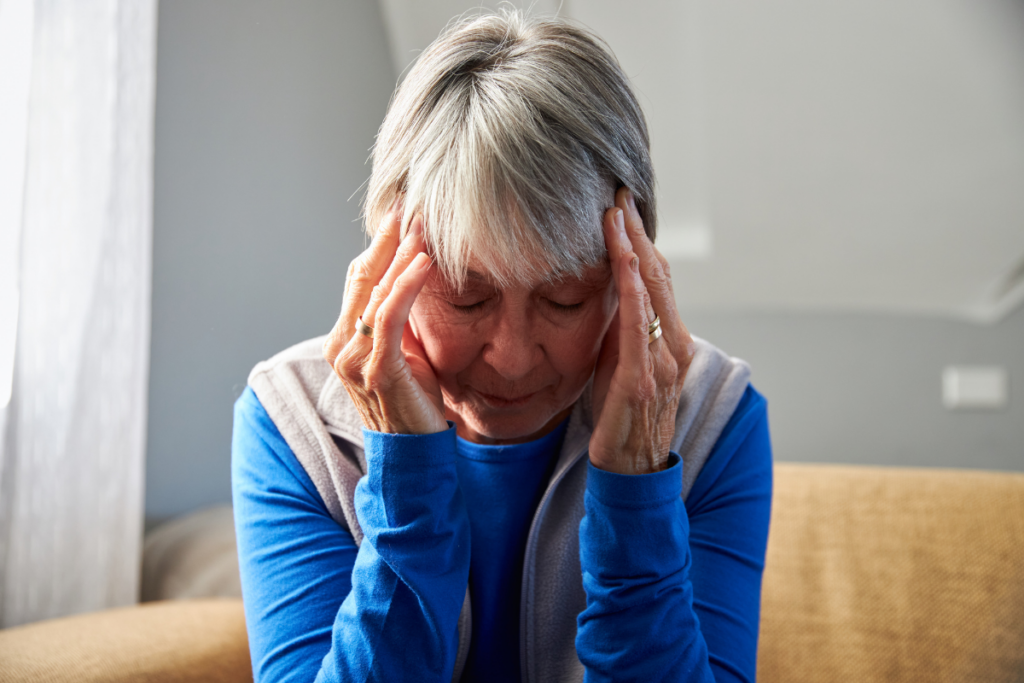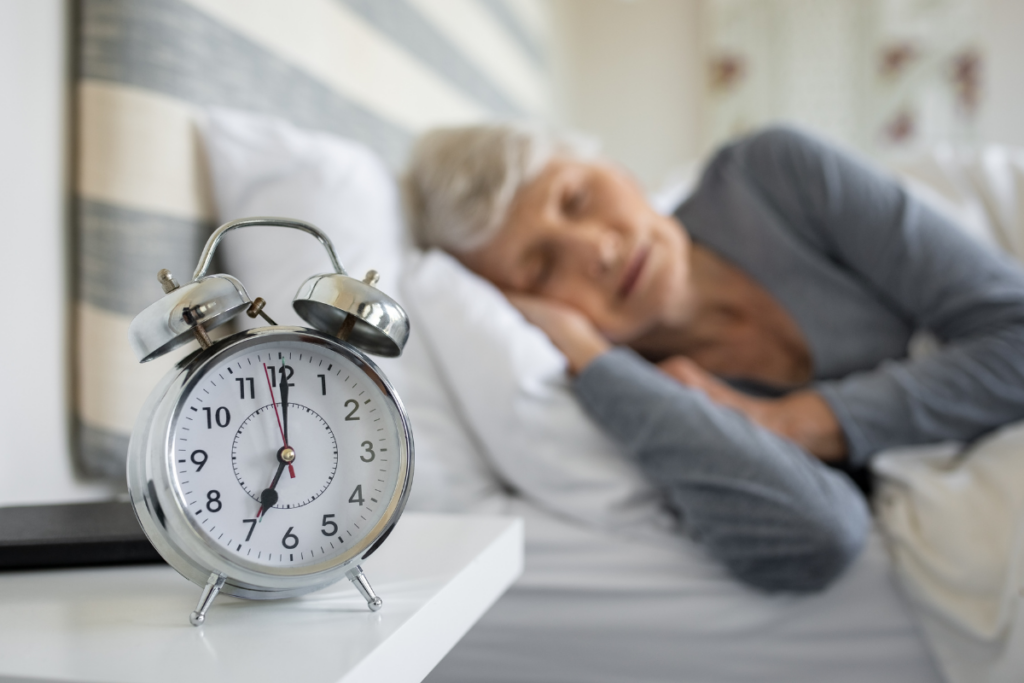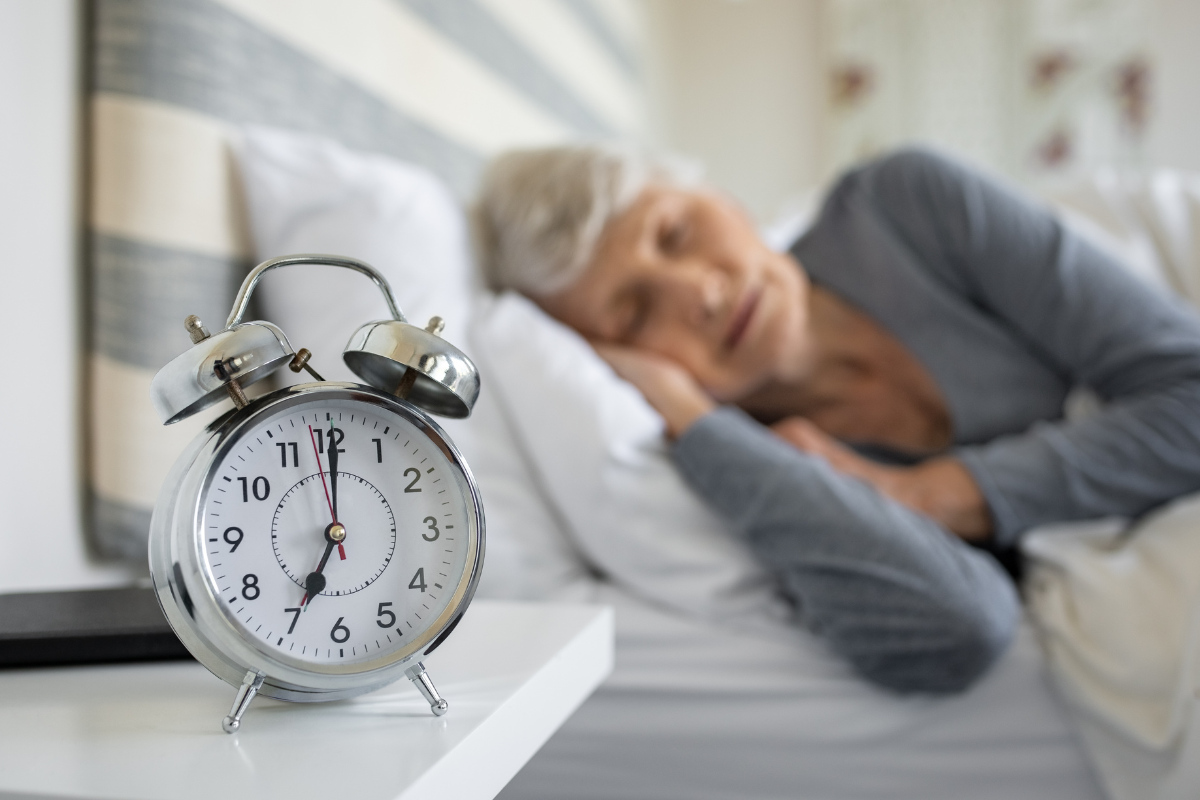It’s normal to experience changes to our sleeping patterns as we age. Becoming tired earlier in the day, waking earlier, and sleeping less deeply, are all common phenomena when we get older. However, sleep is important to our physical and emotional health – whatever our age, and what isn’t normal are symptoms of insomnia and other sleep disorders, such as waking up tired every day and experiencing disturbed sleep.

A good night’s sleep is important for repairing cell damage that occurs during the day, and for refreshing the immune system, preventing disease, and improving concentration and memory. Seniors who have trouble sleeping can suffer from depression and can suffer from the increased risk of falls, cardiovascular disease, diabetes and weight problems. It has also been linked to breast cancer in women.
Care In Kent has put together some information and tips for older adults to identify age-related sleep problems and suggests some ways to overcome them.
Understand How Our Sleep Patterns Change As We Age
When we get older our bodies produce less growth hormone, resulting in shorter periods of deep sleep and a decrease in the body’s production of melatonin. This is why older people are more likely to be light sleepers and experience more fragmented sleep than younger people.
Older people may also:
– Nap during the day to make up for shorter periods of sleep at night
– Fall asleep earlier in the evening and wake up earlier in the morning
None of this indicates a sleep problem. These changes are perfectly normal for older adults.
Changes that aren’t normal, and may indicate a sleep disorder such as insomnia include:
– Trouble falling asleep even when you’re tired
– Trouble getting back to sleep after being woken up
– Feelings of sleepiness or irritability during the day
– A reliance on pills or alcohol to fall asleep
– Trouble controlling your emotions
– Difficulty staying awake when watching TV, sitting still, or driving
– Not feeling refreshed after a night’s sleep

If you or an elderly loved one are experiencing one or more of these symptoms on a regular basis, it’s important to speak to a GP in order to avoid longer-term health problems.
Identify WHY You’re Not Getting Good Quality Sleep
Most cases of insomnia and other sleep disorders are caused by very treatable causes, and it’s important to figure out exactly why you’re having trouble sleeping so that you can be given the right course of treatment.
Ask yourself:
– Are you under stress?
– Have you recently experienced a traumatic event? (such as the death of a spouse or the diagnosis of a serious health condition)
– Are you currently taking any medication that could be affecting your sleep pattern?
– Are you suffering from depression or feelings of hopelessness?
– Do you have a health problem that is affecting your sleep?
If the answer to any of these questions is yes, you might have hit the nail on the head of why you’re not getting good quality sleep.

Common Causes Of Sleep Problems In Older Adults
Bad Habits! – Such as irregular bedtime hours, falling asleep with the TV on, or after alcohol.
Poor Sleep Environment – Go to bed in a comfortable, quiet, dark room. This will be much more conducive to a good night’s sleep than somewhere bright with a lot of background noise such as a TV or radio.
Medical Conditions – There are many conditions that some older people live with that can affect sleep patterns. These include the frequent need to urinate, Alzheimer’s, diabetes, arthritis, asthma, or heartburn.
Medications – It’s much more likely that an older person will be taking regular medications than a younger person, and some of those could interfere with your sleep. If you’re concerned that one of the side effects of prescribed medication is affecting the quality of sleep, speak to a GP to see if some changes can be made. Never stop taking prescribed medication or change the dosage without speaking to a doctor first.
Stress – Big life changes such as retirement, moving home or the death of a loved one can be incredibly stressful, and can have a huge impact on your sleep pattern
Not Enough Exercise – Not getting enough exercise can result in you either never feeling sleepy, or feeling sleepy all the time. Taking regular, light, aerobic exercise can improve mood and promote good sleep

Not Getting Enough Sunlight – Older people produce less melatonin, but bright sunlight will regulate the levels in your body which will help your sleep/wake cycle. Keep blinds and curtains open during the day, or use a light therapy box, and aim for at least 2 hours of sunlight a day.
How To Encourage Better Sleep
There are some things you can do to encourage a better night’s sleep, and more often than not these are just simple lifestyle changes.
For example:
Turn off the TV/laptop/iPhone at least an hour before bed
If you like to read before sleep, stick to a book rather than a tablet or other electronic device
Keep your bedroom quiet and cool. We become more sensitive to noise, light and temperature as we age, so keep your bedroom at a comfortable temperature, and use earplugs and an eye mask if necessary.
If you have a clock in your bedroom, make sure it’s somewhere you can’t see it the instant you open your eyes. Apart from the fact that the light from it could disrupt your sleep, anxiously watching the minutes tick by isn’t going to be good for your insomnia.

You can try reducing mental stress by keeping a journal to record your worries, or by chatting to a partner, friend, family member – or maybe even a professional – if you feel that your mental state is a contributing factor to your disturbed sleep. Listening to calming music, reading something relaxing, and having something warm to drink (nothing with caffeine or alcohol!) can also help.
If you do wake up in the night, the worst thing you can do is focus on the fact that you’re awake – it will only encourage your body to stay awake! Focus instead on relaxation rather than sleep – make that the goal. Try a relaxation technique like breathing exercises or meditation while you lie in bed. Relaxation isn’t a replacement for sleep, of course, but it can help rejuvenate the body, and is a better option than heading downstairs for a coffee and to sit in front of the TV.
If you really can’t relax and you MUST get out of bed – avoid screens if you can. Instead, sit somewhere quietly and perhaps read a book or listen to some soothing music.
Napping Tips!
It’s not uncommon for older people to wake early and then take a nap during the day, and if you’re not getting a lot of good quality sleep at night, and a nap provides you with the energy to get through the rest of the day then go for it!
There are some tips for making the most of your nap:
Do It Early – Nap early in the afternoon, rather than late afternoon/early evening, so as not to disrupt your regular bedtime routine.
Do It Somewhere Comfortable – Ideally, for a good-quality nap, do it somewhere comfortable, with limited lights and noise.
Keep It Short! – You’ll benefit most from a nap around 15-45 minutes long – any longer than that and you risk waking up feeling groggy and not able to concentrate. Shorter is always better. In fact, research shows that even 5 minutes shut-eye can improve alertness and memory.
If stress is a big factor in the life of an elderly loved one, and it’s affecting their sleep, Care In Kent can help. We provide a wide range of at-home care services, from helping with personal care, to running errands, light housework and respite care. If you feel that we could take some of the worry away, please get in touch with our dedicated team.


